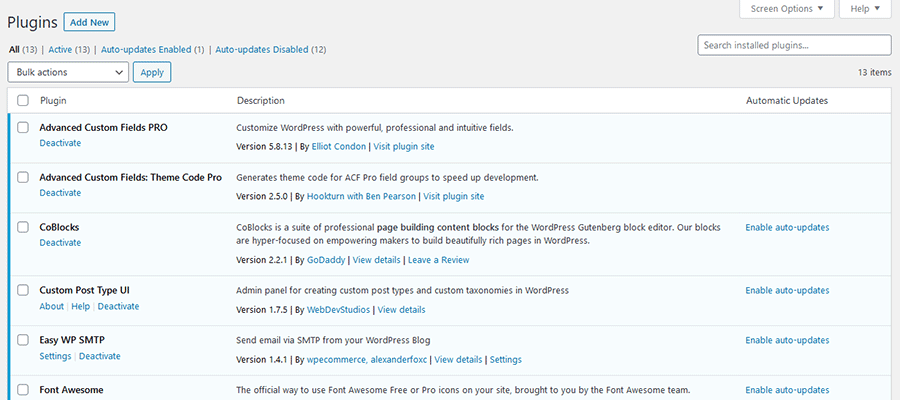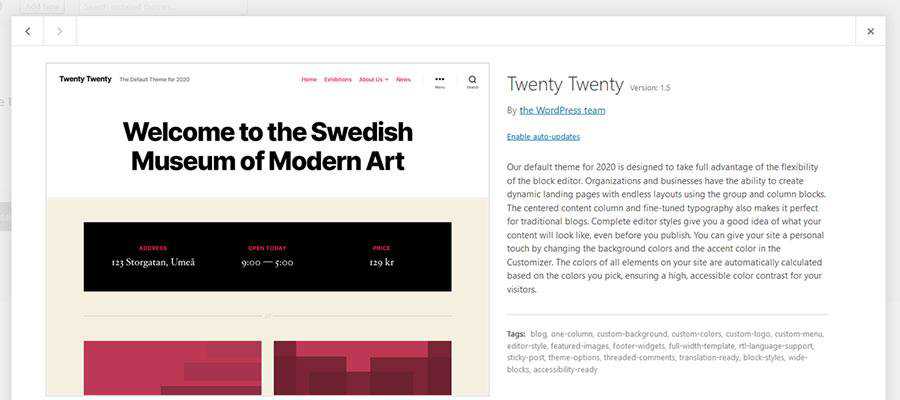Keeping a WordPress installation updated with the latest core, theme and plugin versions can be tough. It’s something that frustrates both web designers and website owners.
Depending on the particular component, updates can be released quite frequently. They could include not only new features, but important bug and security fixes. And the more websites you manage, the harder it is to keep this all under control.
WordPress has done something to try and ease the burden. In version 5.5, an auto-update feature was introduced for both plugins and themes. Now, you can set your website to automatically apply updates as they are released.
This a big step forward in terms of both convenience and security. But it’s not all roses. There are also some potential downsides that come with this functionality.
Are WordPress auto-updates a good fit for you? Here are some things to consider before you jump on board.
Unattended WordPress Updates Can Be Troublesome
Let’s consider a couple of familiar scenarios regarding theme and plugin updates:
Multiple Releases Within Hours
Have you ever installed an updated theme or plugin, only to see that another update for that same item is available a few hours later? That usually happens when there’s an unexpected (and potentially widespread) bug in that initial release. Developers might be responding to user reports or perhaps discovered that the problem exists on their own.
An Update That Breaks Something on a Small Number of Websites
On the other hand, a bug doesn’t necessarily have to be all that widespread. It could only affect those who use a particular plugin or theme in conjunction with the updated item. These may not be as apparent to a developer, thus not patched right away.
In either case, automatic updates could cause problems for your website. It may be a minor, temporary inconvenience or something much worse.
And the size and scope of the software in question doesn’t matter so much. These situations have happened to plugin and theme authors both large and small. The reality is that there are no guarantees.
Plus, it’s not just buggy code that can be problematic. There is also the potential for an update to fail. This happens occasionally when applying updates manually. It usually requires re-installing the plugin via FTP. So, what happens when an auto-update fails?
This is made worse by the fact that a human isn’t there to apply and check the results of the update. If you’re a busy designer or website owner who doesn’t look each and every day, there’s the potential for issues cropping up without your knowledge.
On the bright side, WordPress will send an email to the site administrator’s address when an update has been completed. This will at least provide some impetus to check out the site to ensure everything is working properly. Still, it does require that the administrator receive and take the time to read the message.

You Can Pick and Choose What Gets Updated
It’s also important to note that auto-updates aren’t an all-or-nothing proposition. Site administrators have the ability to select which themes and plugins are updated automatically.
To enable auto-updates on a plugin, visit Plugins > Installed Plugins. Plugins that are compatible with this functionality have an option to “Enable auto-updates”. Click on this link for each plugin you want to automatically update.

For themes, navigate to Appearance > Themes. Click on a compatible theme and you’ll have the option to enable auto-updates there as well.

This particular feature is welcome, as there are some mission-critical items (such as WooCommerce) where manual updates are preferred. On the other hand, plugins that aren’t quite as vital might be a safer bet for automation.
When Do WordPress Auto-Updates Make Sense?
As we mentioned, keeping WordPress websites updated with the latest theme and plugin versions is a challenge. But whether or not you turn on auto-updates for a particular item should depend on a few things:
The Availability of a Site Administrator
If you’re a developer maintaining a website for a client, then it’s probably better to avoid auto-updates. In this case, being there to manually apply updates and inspect the result is both practical and more reliable. It may be wise to simply disable auto updates altogether to keep things in your capable hands.
On the other hand, if you’re simply passing the site off to a client who isn’t technologically-inclined, auto-updates do make sense. Yes, there’s the possibility of running into an issue or two. But that pales in comparison to the potential for unpatched security holes on an outdated installation.
Extra Themes and Part-Time Plugins
It’s not uncommon for a website to have more than one installed theme. For example, the default themes that are bundled with WordPress tend to sit there, whether they’re being used or not.
While we can debate the merits of keeping an unused theme, this may be an area where auto-updates are worthwhile. This ensures that bug fixes are installed and security threats are mitigated.
Likewise, there are instances where a plugin is installed and only activated for periodic tasks. Again, maybe not a recommended practice, but it happens nonetheless. You may as well keep it updated.

Auto-Updates Are a Step Forward…For Those Who Need It
For web professionals, the ability to automatically apply WordPress theme and plugin updates may not be the most attractive thing. That’s because we tend to think of the potential issues such a feature can cause. Fair enough.
But there are some cases where it can be quite useful. For website owners who aren’t interested in or knowledgeable of maintaining a WordPress install, this could be just what the doctor ordered. The benefits probably outweigh the risks.
Like a lot of WordPress functionality, the software gives you the ultimate say. If auto-updates sound like something that will work for you, give it a try. Otherwise, you can maintain the status quo.
Related Topics
Top